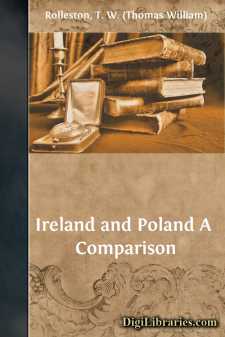Categories
- Antiques & Collectibles 13
- Architecture 36
- Art 48
- Bibles 22
- Biography & Autobiography 813
- Body, Mind & Spirit 142
- Business & Economics 28
- Children's Books 17
- Children's Fiction 14
- Computers 4
- Cooking 94
- Crafts & Hobbies 4
- Drama 346
- Education 46
- Family & Relationships 57
- Fiction 11829
- Games 19
- Gardening 17
- Health & Fitness 34
- History 1377
- House & Home 1
- Humor 147
- Juvenile Fiction 1873
- Juvenile Nonfiction 202
- Language Arts & Disciplines 88
- Law 16
- Literary Collections 686
- Literary Criticism 179
- Mathematics 13
- Medical 41
- Music 40
- Nature 179
- Non-Classifiable 1768
- Performing Arts 7
- Periodicals 1453
- Philosophy 64
- Photography 2
- Poetry 896
- Political Science 203
- Psychology 42
- Reference 154
- Religion 513
- Science 126
- Self-Help 84
- Social Science 81
- Sports & Recreation 34
- Study Aids 3
- Technology & Engineering 59
- Transportation 23
- Travel 463
- True Crime 29
Ireland and Poland A Comparison
Categories:
Description:
Excerpt
IRELAND AND POLAND
The United Kingdom is composed of four distinct nationalities. Each of these has retained its own distinct character, its own national history, its own patriotism and self-respect. Their affairs, great and small, general or local, are administered by one Parliament in which each is fully represented. A large majority of the Irish people have, however, asked that in addition to some representation in the united Parliament they shall be granted a local Parliament for the management of their own internal affairs. The fact that this demand, which has an important imperial as well as local bearing, has not yet been complied with has constantly been used by the enemies of the Entente Powers to represent as false and hypocritical the claims of those Powers to be regarded as the champions of the rights of small nationalities; and the case of Ireland has been compared with that of Prussian Poland, as though the peoples of these two countries were suffering the same kind of oppression, the same injustice, the same denial of the right of every man to live and prosper in his own land on equal terms with his fellow-citizens in every other part of the realm.
The best answer to this charge is to tell plainly, without contention or exaggeration, what the united Parliament has done for Ireland since the beginning of the period of reform nearly fifty years ago. That is what is here attempted, so far as it can be done in a few pages. It must be fully understood that on the Home Rule question the present statement has no bearing whatever. That difficult problem lies in an altogether different sphere of politics, and must he judged by considerations which cannot be touched on here. Without, however, trenching in any degree on controversial ground, it may be pointed out that the crucial difficulty of the Home Rule question lies, and has always lain, in the fact that in Ireland a substantial and important minority amounting to about 25 per cent. of the population, and differing from the rest of the country in religion, national traditions, and economic development, has hitherto been resolutely opposed to passing from the immediate government of the imperial Parliament to that of any other body. This minority being, for the most part, grouped together in the North-east counties, the late Government attempted to solve the difficulty by offering immediate Home Rule to that section of Ireland which desires it, while leaving the remainder as it is until Parliament should otherwise decree. This proposal was rejected by the general opinion of Nationalist Ireland, which was firmly opposed to the partition of the country for any indefinite period. The question, therefore, remains for the present in suspense, until a solution can be found which will not only ensure the integrity and security of the Empire but reconcile the conflicting desires and interests of Irishmen themselves.
Ireland Fifty Years Ago
So much to clear the ground in regard to the Home Rule controversy. I shall now ask the reader to glance for a moment at the condition of Ireland fifty years ago....


